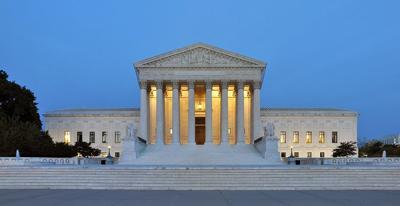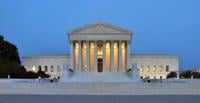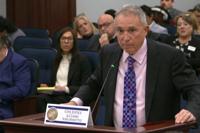
U.S. Supreme Court
WASHINGTON – An amicus brief urges the U.S. Supreme Court to protect the rights of parents in a case alleging Florida school officials concealed gender identity conversations from the parents of a child considering transitioning.
The Liberty Justice Center, the California Justice Center and the Wisconsin Institute for Law & Liberty filed their brief October 6 in the case Littlejohn v. School Board of Leon County.
The case involves parents January and Jeffrey Littlejohn, who say a local school concealed from them “critical conversations” with their child about gender identity and proceeded to socially transition the child with a new name and pronouns without notifying or involving the parents.
The amicus brief was filed on behalf of Dr. Erica E. Anderson, a transgender clinical psychologist with more than 45 years of experience counseling children and adolescents on gender-identity-related issues.
“Drawing on her decades of practice, Dr. Anderson emphasizes that proper care for children experiencing gender incongruence ultimately requires the involvement of their parents,” the Liberty Justice Center said in a statement. “The filing argues that excluding or deceiving parents in this decision violates longstanding Supreme Court precedent protecting parents’ right to direct their children’s upbringing, most recently reaffirmed in the court’s 2025 Mahmoud v. Taylor decision.
“The brief further explains that the deliberate deception of parents crosses a constitutional line that “shocks the conscience.”
An LJC official said the issue is vitally important.
“These secrecy policies unlawfully strip parents of their fundamental right to guide their children’s upbringing and health decisions,” said Dean McGee, senior counsel and director of educational freedom. “With courts nationwide divided on this critical issue, the Supreme Court must step in to provide clarity and reaffirm parents’ fundamental rights.”
The brief says Anderson has seen hundreds of children and adolescents for gender-identity-related issues, many of whom transition, with her guidance and support.
“Courts have recognized Dr. Anderson’s expertise,” the brief states. “As a practitioner serving children and adolescents experiencing gender incongruence, Dr. Anderson has a strong interest in ensuring that such children receive the best possible care (whether or not they ultimately transition), which, in her view, requires involving their parents.”
The brief also is critical of the policies of the Leon County School District.
“The Leon County School District — like over a thousand other school districts around the country, covering more than 12 million students — had a policy to secretly facilitate gender identity transitions at school and to hide this from parents who might disagree with this approach,” the brief states. “School is now like Las Vegas: ‘What happens at school stays at school.’
“These policies have generated nearly 40 lawsuits, with many more to come. These cases should be easy on the merits. As this court has long recognized and recently reaffirmed, parents have a ‘constitutional right to make decisions concerning the rearing of [their] own [children].’ Any attempt by the government to ‘supersede parental authority’ is both unconstitutional and ‘repugnant to American tradition.’
“The ‘decisional framework’ is what matters — government must apply a ‘presumption that a fit parent will act in the best interest of his or her child.’”
Court documents show that the parents say school officials attempted to “transition” their 13-year-old daughter from female to male without their knowledge or consent. The parents sued the school for violating their fundamental parental rights under the Fourteenth Amendment.
In March, the Eleventh Circuit Court of Appeals ruled the conduct of the school officials did not “shock the conscience,” but a dissenting judge in the case called the majority ruling “totally bizarre.”
The parents then asked the full Eleventh Circuit to rehear the case en banc, saying they don’t need to demonstrate that government officials’ conduct “shocked the conscience” to vindicate their constitutional rights.
Last month, the parents asked the Supreme Court to hear the matter. Their petition asks, in part, “When a plaintiff alleges that the application of a state policy infringed a fundamental right ‘deeply rooted in this nation’s history and tradition,’ can a court deny relief because the infringement did not ‘shock the conscience?’”
“As the petition amply explains, the Eleventh Circuit’s application of the ‘shocks the conscience’ test was inappropriate given that petitioners’ claim is based on their fundamental parental rights,” the LJC brief states. “But even if that test applies here, the district’s actions were conscience-shocking.
“A social transition is a major, health-related decision with long-term implications. And excluding parents from this decision violates their constitutionally protected decision-making authority. Schools cannot give children a Tylenol without parental consent; facilitating a secret gender transition is far more serious. This Court should grant the petition and reverse.”






